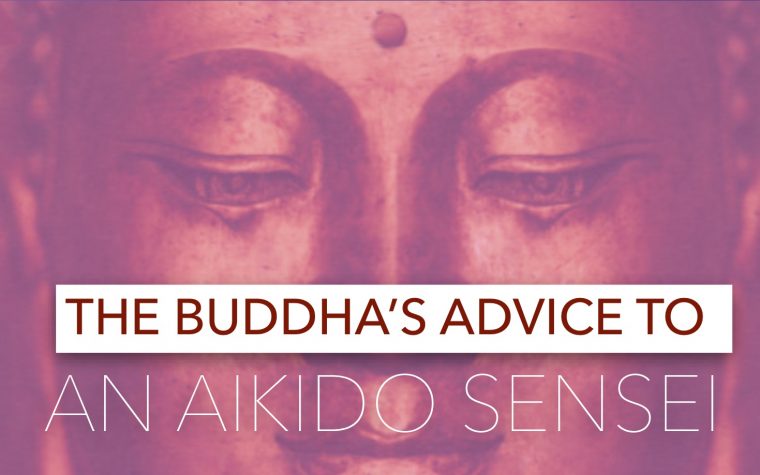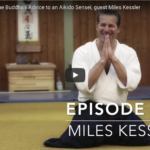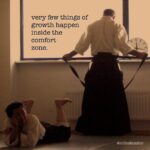The early Buddhist term for a teacher is a “Kalyanamitta” – which means a “Noble Friend.” I love this phrase because it reframes the role of the teacher and student, and how this holy relationship impacts your life. In this blog post, I will share with you the advice the Buddha gave in his teaching on the 5 qualities of a “Nobel Friend.” As Aikido is a higher path of practice, I think that these guidelines are especially relevant to Aikido teachers. This is the Buddha’s advice to an Aikido Sensei.

As a practitioner of Aikido, you are committed to walking a higher path of practice. A path that demands perfection, that you walk as an imperfect human being. The tension created by the demands of a higher path and your own human imperfections, are the exact conditions needed to grow in body, mind, heart and, spirit.
It is a path of purification and its purifying process will gradually lead you towards maturity as a teacher. And regardless of your teaching style, when you reach maturity on such a path there will be 5 qualities that will stand out, and shine brightly in you. It is these 5 qualities that give you the right to guide others along the same path.
These are the 5 qualities of a spiritually mature teacher.
1. A Mature Teacher Is Lovable
The teaching style of every mature teacher falls somewhere on the spectrum between “compassion” and “wisdom.” Teachers who are more on the compassion end of the spectrum work with students through love and care, giving endless support to the student. A teacher who is more on the wisdom end of the spectrum will approach things with discipline and strictness, constantly challenging their students to achieve their potential.
Regardless of where a teacher is on this spectrum, there is just something about who they are that makes them lovable. It may be their open and accepting heart, it may be their clarity of truth, or it may just be something about their way of Being. What ever the case, they are simply lovable to the students who choose to learn from them.
Generally speaking, martial artists tend to be more on the discipline end of the spectrum. By all accounts, even O Sensei could raise hell with his students at the drop of a hat. But he also had a boundless heart which he shared with the world. His Aikido was an art of Love, and his expression of Love has opened the hearts of all his students even to this day.
2. A Mature Teacher Is Worthy Of Your Love
To be lovable is one thing, but to be worthy of that love is entirely something else. To be a teacher who is worthy of a student’s love means that you hold to, and live by a higher moral and ethical code. This means that both your speech and conduct will be life affirming. And that you will not cause any intentional harm to others.
When following a teacher the student is placing a certain amount of power in the teacher’s hands. It is an unfortunate fact that there have been lovable teachers who have abused their position of power and crossed moral and ethical red lines with students. We don’t have to look far to see examples of this both inside and outside of the Aikido world. The deep damage that this causes to the student, to the teacher, and to the art – cannot be underestimated.
As a teacher, you need to hold a higher moral and ethical code as a role model for anyone walking the Path. Should you have a moment of moral or ethical transgression (after all, you are human) then it is crucial that you take ownership of your mistake. It is your responsibility to do what ever it takes to heal any damage done.
One of your jobs as a teacher is to protect this code dearly. By doing so you will protect your students, you will protect your community, you will protect the art, and you will protect yourself. Your higher moral and ethical standard will be a shining example that is truly worthy of your students love.
3. A Mature Teacher Is Deeply Experienced In Both Practice And Theory
If you want to reach any new destination then it is important to have a good map. But we all know that the map is not the territory. To reach your goal, at some point you will need to put down the map and walk the territory. You need to practice.
One thing you can say for all the teachers who have taken their art (Aikido or otherwise) to a relatively advanced level: without exception, they have put in their time training. Usually, years of training (if not decades) under highly advanced teachers. But simply going through years of repetitive training does not necessarily take you to advanced levels. You also need a solid theory to take you to your destination.

Theory and practice are akin to the map and the territory. They support and reinforce each other at every level of development. As a mature teacher, you need to be able to explain the theory of the practice – and demonstrate the practice of the theory. Knowing the value of practice and theory you respect how both are complementary aspects of the same developmental path.
4. A Mature Teacher Has The Ability To Say Difficult Things
As a teacher, it is important that you use skillful means when communicating wisdom to students. Using the right words at the right time (or no words, as the case may be) can trigger off a process of awakening in a student. With a well-placed word, you can save the student years of wasted time in side tracks, backslides, and dead ends. To create this capacity, you need to cultivate the ability to say difficult things.
My core meditation teacher, the late Sayadaw U Pandita, taught that the ability to say difficult things has 2 meanings:
- The first meaning is that you can be strict with the student if needed. This includes admonishing them when necessary or giving them a dose of tough love with the direct truth. This will without a doubt be unpleasant for the student in the short term, and you may even risk that they will leave you. Although this may be highly unpleasant to the student, speaking the truth in this way does not create any suffering for them. It only exposes the suffering that is already there and is being denied. A word of “tough love” at an appropriate time will save the student much time in needless suffering. If you clearly see the truth of a student’s situation that is causing suffering to themselves or others, and it falls in your role as their teacher to tell them, then you actually have an obligation to confront them directly about it. Even if it is hard for them to hear. Even if it is hard for you to say.
- The second meaning of being able to say difficult things is that in your teaching you can take the profound concepts and principles of Aikido and speak about them in a clear and simple way according to their level. A mature teacher intuitively “gets” where the student is at, and what is their potential. When teaching, you help the student see when they are back sliding, you affirm where they are at, and you show them what is coming for them in their development. You are able to both communicate and demonstrate the complexity of Aikido in a way that the student can understand and put into their practice.
5. A Mature Teacher Is Motivated Solely For Benefit Of The Students
As a mature teacher, you are motivated to teach solely for the benefit of your student. You are not motivated by material gain, by fame, or by pride. Furthermore, there should be no obligation put on the student, or feeling that they need to give back in any way for the teachings they receive. What matters is that they respect the teachings and are sincere about the path of practice. Everything else is secondary.
In traditional Asian cultures, it was often the case that teachers gave their teachings for free, and the students would return in kind with donations. Even O Sensei did this right after the war in Iwama as it was in the poverty stricken country side. The local students were poor farmers who trained for free. There was an energetic exchange because they returned the value of O Sensei’s teaching by bringing food from their fields for him and his family to live on.
Here in the modern West, we have another system of a fare payment for services received. But even within this monetary system, there is a respectful energetic exchange. It is totally possible for a mature teacher to live within this 5th quality in a system of monetary exchange. It’s the intention that makes all the difference.
As a mature teacher, it is important to constantly check your intention when offering your best teachings to your students. Because great teachings are a great value to those who receive. It is a value that is beyond money, fame, or pride. All mature teachers reflect this.
I hope that the Buddha’s advice to an Aikido Sensei will serve as a point of reflection for you. What does the role of a “Kalyanamitta” – a Noble Friend, mean in your life? And how do these 5 qualities of a mature teacher show up in your own practice?
The fact is that all of us, especially teachers, are always students. On your own personal path, should you have the good fortune to meet a teacher (or teachers) who fulfills these 5 qualities, then you should approach them and learn from them.
But remember, when they challenge you (and they will) or make you feel uncomfortable (and they will), that’s their job. Be grateful, because you will only grow in their presence.
Question: What other qualities of a mature teacher do you see as important in Aikido? Leave your comments below!

![THE BUDDHA’S ADVICE TO AN AIKIDO SENSEI [ENCORE POST]](https://theintegraldojo.com/wp-content/uploads/2017/08/BuddhasAdviceToAnAikidoSensei-150x150.jpg)
![[Encore Post] The Aikido Koan](https://theintegraldojo.com/wp-content/uploads/2018/03/TheAikidoKoan-150x150.jpg)



Please note: I reserve the right to delete comments that are offensive or off-topic.